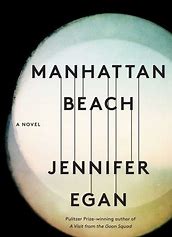“It only hurts at first… After a while, you can’t feel anything.”
Author: Jennifer Egan
 At first glance, the Jennifer Egan of Manhattan Beach does not appear to be the Jennifer Egan of A Visit from the Goon Squad. Her last (and breakthrough) novel was published in 2011. You might recall that it’s an irreverent, slightly futuristic story about punk music, shoplifting and celebrity, featuring footnotes and even a PowerPoint presentation.
At first glance, the Jennifer Egan of Manhattan Beach does not appear to be the Jennifer Egan of A Visit from the Goon Squad. Her last (and breakthrough) novel was published in 2011. You might recall that it’s an irreverent, slightly futuristic story about punk music, shoplifting and celebrity, featuring footnotes and even a PowerPoint presentation.
Manhattan Beach feels like it was written on a different planet. There are no footnotes or PowerPoints. Instead of the wail of electric guitars, we hear the lapping of waves and calling of seagulls. This time around, the bold and eclectic Egan has crafted a big, fat, literary historical novel that is old-fashioned in the best ways: it’s got characters you can root for, a plot that will keep you up at night, and all the delicious things like seduction, suspense and adventure.
Manhattan Beach begins in Depression-era Brooklyn. The first chapter serves as the launch pad for the entire book, so pay close attention. Twelve-year-old Anna Kerrigan is accompanying her father, Eddie, on a visit to one of his business associates. Dexter Styles is a nightclub owner: formidable, filthy rich, and connected to all the right (and wrong) people. Their meeting on the beach assumes an ominous feel, but because Anna is in attendance—her little toes in the cold, wet sand—we want to believe in Eddie and Dexter’s goodness. (No spoilers here, but it takes a long while before we can arrive at any conclusions about their integrity or motivation.)
After this haunting opening section, the novel jumps ahead: Anna is almost 20 and the Second World War is underway. We learn that Eddie has been missing for five years. Is he dead? Is he alive? Did he willingly leave his family? Anna is too preoccupied to dwell on these matters, because she is working at the Brooklyn Naval Yard to support her mother and disabled younger sister.
The scenes of Anna at work are gorgeously rendered and the most satisfying in the book. (Egan conducted years of research prior to writing Manhattan Beach, and her attention to detail shines.) Anna starts out measuring the size of tiny parts for war ships, but she hates the monotony. Instead, she wants to be a diver, performing underwater ship repair in Wallabout Bay. Although her aspirations are met with sexism and ridicule, Anna is intrepid. She proves herself time and time again to become the first female civilian diver—a job that does far more than pay the rent. It slakes a deep hunger within her: “Whatever direction Anna went… she was drawn inevitably onto the piers.” Even as the novel unfolds and sweeps the reader away with its various scandals (some easier to swallow than others), Anna keeps the story feeling grounded and fresh.
The themes that link the disparate parts of Manhattan Beach are classic Egan. She is consistent, at least, with this: whether she gives us an aging punk rocker or a crooked gangster, it’s evident that all of us, regardless of generation or occupation, wrestle with the same ordeals—like the disquieting passage of time, the redefining of ourselves to stay relevant, and the need for personal transformation “almost instantaneous, like the flick of a kaleidoscope.” Her characters—flawed and, in many cases, tragic—understand that everything can go up in smoke without warning: “He felt how easily a man’s life could slip away, separated from him by thousands of miles of empty space.”
Manhattan Beach is sobering, yes. But it offers up moments of clarity and compassion that make it a deeply rewarding page-turner.
[AMAZONPRODUCTS asin=”1476716730″]
- Northwoods Author Amy Pease Interview and Book Recommendations - April 29, 2024
- Still True author Maggie Ginsberg:Interview and Book Recommendations - September 14, 2022
- When wood and words come together:A children’s picture book is born - June 30, 2022


